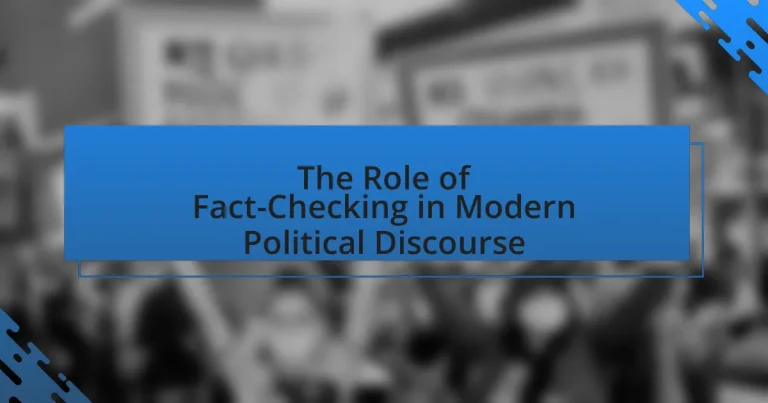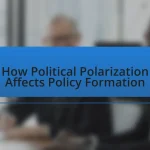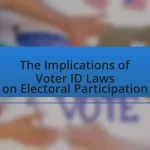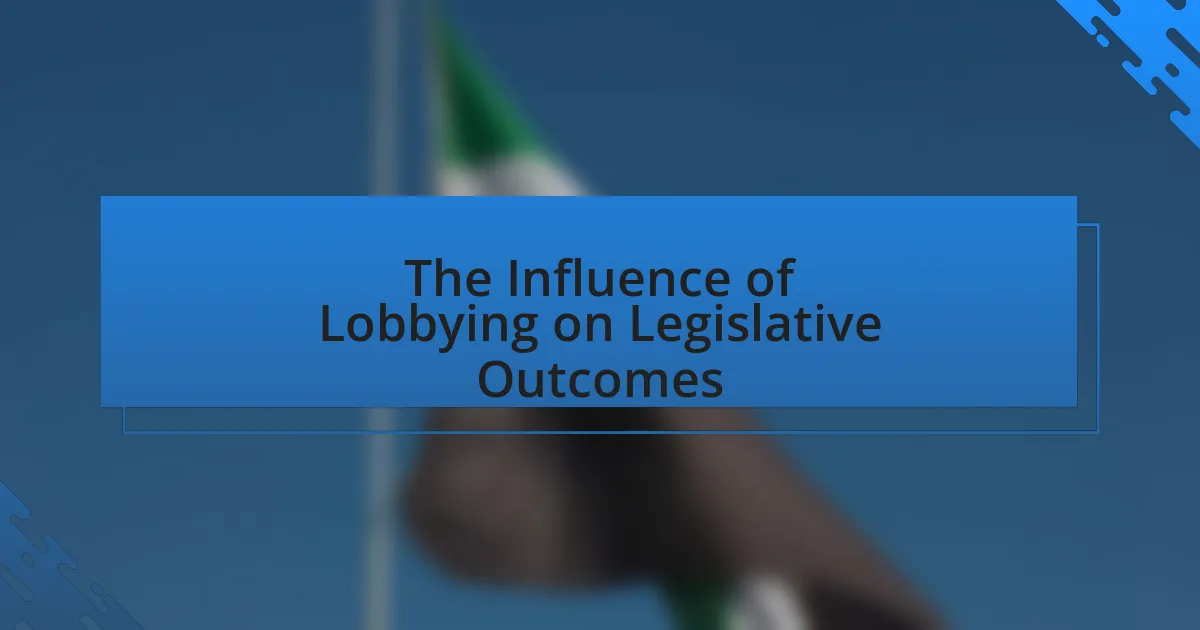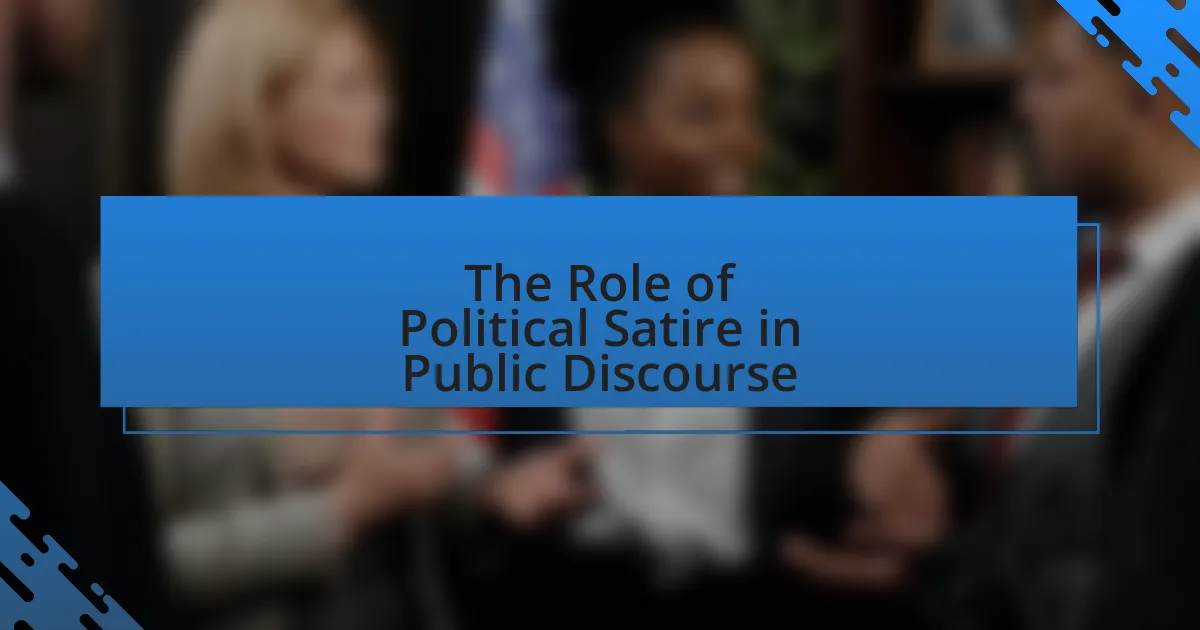Fact-checking is a vital component of modern political discourse, serving to verify the accuracy of claims made by politicians and media, thereby promoting accountability and informed decision-making among citizens. Organizations such as PolitiFact and FactCheck.org play a crucial role in this process by providing evidence-based assessments that combat misinformation and enhance public debate. The article explores the influence of fact-checking on political narratives, the key components of effective fact-checking, the challenges faced in a polarized environment, and the impact of misinformation on public opinion. Additionally, it discusses strategies for improving fact-checking practices and the importance of technology and education in fostering informed citizenship.

What is the Role of Fact-Checking in Modern Political Discourse?
Fact-checking plays a crucial role in modern political discourse by ensuring the accuracy of information disseminated to the public. It serves to verify claims made by politicians, media, and other influential figures, thereby promoting accountability and informed decision-making among citizens. For instance, organizations like PolitiFact and FactCheck.org systematically evaluate statements and provide evidence-based assessments, which helps to combat misinformation and enhances the overall quality of public debate. Studies have shown that fact-checking can significantly reduce the spread of false information, as seen in the 2020 U.S. presidential election, where fact-checking initiatives were linked to increased public awareness of misleading claims.
How does fact-checking influence political narratives?
Fact-checking significantly influences political narratives by promoting accuracy and accountability in public discourse. When fact-checkers assess claims made by politicians and media, they provide evidence-based evaluations that can either validate or refute those claims. For instance, a study by the Pew Research Center found that fact-checking can lead to a decrease in the spread of misinformation, as individuals exposed to fact-checked information are more likely to adjust their beliefs accordingly. This process not only shapes public perception but also pressures political figures to adhere to factual accuracy, thereby altering the overall narrative landscape in politics.
What are the key components of effective fact-checking?
The key components of effective fact-checking include accuracy, transparency, and accountability. Accuracy ensures that the information being verified is correct and based on reliable sources, which is crucial in maintaining credibility. Transparency involves clearly outlining the sources and methods used in the fact-checking process, allowing others to verify the findings independently. Accountability requires fact-checkers to take responsibility for their work, including correcting any errors promptly. These components are essential for fostering trust in the fact-checking process and enhancing the quality of information in political discourse.
How do fact-checkers determine the accuracy of claims?
Fact-checkers determine the accuracy of claims by verifying information against credible sources and evidence. They typically follow a systematic process that includes identifying the claim, researching relevant data, consulting experts, and cross-referencing multiple reliable sources. For instance, organizations like PolitiFact and FactCheck.org utilize databases, academic research, and official documents to substantiate or refute claims made by public figures. This methodical approach ensures that the fact-checking process is grounded in factual accuracy and transparency, thereby enhancing the credibility of the information presented to the public.
Why is fact-checking essential in today’s political landscape?
Fact-checking is essential in today’s political landscape because it helps to verify the accuracy of information disseminated by politicians and media, thereby promoting informed public discourse. In an era where misinformation can spread rapidly through social media, fact-checking serves as a critical tool to hold public figures accountable for their statements. For instance, a study by the Pew Research Center found that 64% of Americans believe that fact-checking is important for democracy, highlighting its role in fostering transparency and trust. By providing evidence-based assessments of claims, fact-checking mitigates the impact of false narratives and supports a more informed electorate.
What impact does misinformation have on public opinion?
Misinformation significantly distorts public opinion by shaping beliefs and attitudes based on false or misleading information. Studies indicate that exposure to misinformation can lead to the formation of incorrect perceptions about political issues, candidates, and policies. For instance, research published in the journal “Science” by Lewandowsky et al. (2012) demonstrates that individuals who encounter misinformation are more likely to hold inaccurate beliefs, even after being presented with factual corrections. This distortion can result in polarized views, decreased trust in media and institutions, and ultimately influence electoral outcomes.
How does fact-checking contribute to informed citizenship?
Fact-checking contributes to informed citizenship by providing citizens with accurate information that enables them to make educated decisions about political issues and candidates. When fact-checking organizations verify claims made by public figures and media, they help to clarify misinformation and promote transparency. For instance, a study by the Pew Research Center found that 64% of Americans believe that fact-checking helps them understand political issues better. This process empowers citizens to engage in meaningful discussions and hold leaders accountable, ultimately fostering a more informed electorate.
What challenges do fact-checkers face in modern political discourse?
Fact-checkers face significant challenges in modern political discourse, primarily due to the rapid spread of misinformation and the increasing polarization of political views. The prevalence of social media platforms allows false information to circulate quickly, often outpacing fact-checking efforts. Additionally, fact-checkers encounter difficulties in accessing reliable sources and verifying claims, especially when information is deliberately obfuscated or manipulated. The emotional resonance of misinformation can also lead to resistance against fact-checking, as individuals may reject factual corrections that contradict their beliefs. According to a study by the Pew Research Center, 64% of Americans believe that misinformation is a major problem in political discourse, highlighting the urgency of the challenges faced by fact-checkers in maintaining accuracy and trust in information.
How do biases affect the fact-checking process?
Biases significantly affect the fact-checking process by influencing the selection of claims to verify and the interpretation of evidence. Fact-checkers may prioritize information that aligns with their own beliefs, leading to a skewed representation of facts. For instance, a study by the Pew Research Center found that political affiliations can shape how individuals perceive the credibility of information, affecting their willingness to accept fact-checks that contradict their views. This selective verification can result in a lack of objectivity, ultimately undermining the integrity of the fact-checking process.
What are the limitations of fact-checking in a polarized environment?
Fact-checking in a polarized environment faces significant limitations, primarily due to entrenched biases and selective exposure among audiences. Individuals often disregard fact-checks that contradict their pre-existing beliefs, leading to confirmation bias, where they only accept information that aligns with their views. Research indicates that in highly polarized contexts, such as during election cycles, fact-checking efforts can reinforce partisan divides rather than bridge them, as people may perceive fact-checkers as biased themselves. Additionally, the rapid spread of misinformation through social media complicates the effectiveness of fact-checking, as false narratives can gain traction faster than they can be debunked. This dynamic creates an environment where fact-checking struggles to achieve its intended impact, as the audience’s willingness to engage with factual corrections is diminished.
How can fact-checking be improved in political discourse?
Fact-checking can be improved in political discourse by enhancing collaboration between fact-checking organizations, media outlets, and social media platforms. This collaboration can facilitate the rapid dissemination of verified information and counter misinformation effectively. For instance, partnerships between organizations like PolitiFact and major news networks have shown that sharing resources and expertise leads to more comprehensive fact-checking coverage. Additionally, implementing automated tools that flag potentially false claims in real-time can help identify misinformation before it spreads widely. Research from the Pew Research Center indicates that 64% of Americans believe that fact-checking is essential for a healthy democracy, underscoring the need for improved mechanisms in this area.
What role do technology and social media play in enhancing fact-checking?
Technology and social media significantly enhance fact-checking by providing real-time access to information and facilitating widespread dissemination of verified data. Platforms like Twitter and Facebook allow fact-checkers to quickly share corrections and updates, reaching large audiences almost instantaneously. For instance, during the 2020 U.S. presidential election, organizations like FactCheck.org and PolitiFact utilized social media to counter misinformation, resulting in increased public awareness and engagement with factual content. Additionally, advanced algorithms and AI tools help identify false claims and track their spread, making it easier for fact-checkers to address inaccuracies promptly.
How can educational initiatives promote better understanding of fact-checking?
Educational initiatives can promote better understanding of fact-checking by integrating critical thinking and media literacy into curricula. These initiatives equip students with the skills to analyze information sources, discern credible data, and recognize misinformation. For instance, programs like the News Literacy Project have demonstrated that teaching students how to evaluate news sources significantly improves their ability to identify factual inaccuracies. Research indicates that students exposed to structured fact-checking education are more likely to engage in responsible information consumption, thereby fostering a more informed public discourse.
What are the best practices for engaging with fact-checking resources?
The best practices for engaging with fact-checking resources include verifying the credibility of the source, cross-referencing information with multiple fact-checking organizations, and understanding the context of the claims being fact-checked. Credible sources, such as PolitiFact and FactCheck.org, adhere to rigorous standards for accuracy and transparency, which enhances the reliability of their findings. Cross-referencing helps to confirm the validity of the information, as different organizations may provide varying perspectives on the same claim. Additionally, comprehending the context ensures that the fact-checking is relevant and accurately reflects the original statement, preventing misinterpretation. Engaging with these practices fosters informed decision-making and enhances the quality of political discourse.
How can individuals effectively use fact-checking tools in their political discussions?
Individuals can effectively use fact-checking tools in their political discussions by verifying claims made during conversations with reliable sources. Utilizing established fact-checking websites, such as Snopes or FactCheck.org, allows individuals to cross-reference statements against documented evidence. For instance, if a participant in a discussion asserts that a politician made a specific statement, checking that claim on a reputable fact-checking site can confirm its accuracy or provide context. This practice not only enhances the credibility of the discussion but also encourages informed dialogue based on verified information, thereby reducing the spread of misinformation.
What strategies can help discern credible fact-checking sources?
To discern credible fact-checking sources, one effective strategy is to evaluate the organization’s transparency regarding its funding, methodology, and editorial standards. Credible fact-checking organizations, such as PolitiFact and FactCheck.org, openly disclose their funding sources and provide clear explanations of their fact-checking processes, which enhances their reliability. Additionally, checking for affiliations with reputable journalism organizations or academic institutions can further validate a source’s credibility. Research indicates that transparency correlates with trustworthiness; for instance, a study by the Pew Research Center found that 62% of Americans believe that transparency in funding is crucial for assessing the credibility of news sources.
